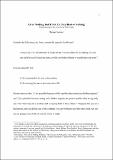Files in this item
All or nothing, but if not all, next best or nothing
Item metadata
| dc.contributor.author | Pummer, Theron | |
| dc.date.accessioned | 2020-04-30T23:34:14Z | |
| dc.date.available | 2020-04-30T23:34:14Z | |
| dc.date.issued | 2019-05-15 | |
| dc.identifier | 257610308 | |
| dc.identifier | 0c9d61f5-2846-432f-a3c5-03741b8d96f7 | |
| dc.identifier | 000468110700002 | |
| dc.identifier | 85068133606 | |
| dc.identifier.citation | Pummer , T 2019 , ' All or nothing, but if not all, next best or nothing ' , Journal of Philosophy , vol. 116 , no. 5 , pp. 278-291 . https://doi.org/10.5840/jphil2019116518 | en |
| dc.identifier.issn | 0022-362X | |
| dc.identifier.other | ORCID: /0000-0003-0147-9917/work/69029351 | |
| dc.identifier.uri | https://hdl.handle.net/10023/19871 | |
| dc.description.abstract | Suppose two children face a deadly threat. You can either do nothing, save one child by sacrificing your arms, or save both by sacrificing your arms. Here are two plausible claims: first, it is permissible to do nothing; second, it is wrong to save only one. Joe Horton argues that the combination of these two claims has the implausible implication that if you are not going to save both children, you ought to save neither. This is one instance of what he calls the ALL OR NOTHING PROBLEM. I here present CONDITIONAL PERMISSIONS as the solution. Although saving only one child is wrong, it can be conditionally permissible, that is, permissible given what you are not going to do. You ought to save both children or save neither, but if you are not going to save both, you ought to do the next best thing (save one) or save neither. | |
| dc.format.extent | 640683 | |
| dc.language.iso | eng | |
| dc.relation.ispartof | Journal of Philosophy | en |
| dc.subject | B Philosophy (General) | en |
| dc.subject | T-NDAS | en |
| dc.subject | BDC | en |
| dc.subject.lcc | B1 | en |
| dc.title | All or nothing, but if not all, next best or nothing | en |
| dc.type | Journal article | en |
| dc.contributor.institution | University of St Andrews. Centre for the Study of Philanthropy & Public Good | en |
| dc.contributor.institution | University of St Andrews. Centre for Ethics, Philosophy and Public Affairs | en |
| dc.contributor.institution | University of St Andrews. Philosophy | en |
| dc.identifier.doi | https://doi.org/10.5840/jphil2019116518 | |
| dc.description.status | Peer reviewed | en |
| dc.date.embargoedUntil | 2020-05-01 |
This item appears in the following Collection(s)
Items in the St Andrews Research Repository are protected by copyright, with all rights reserved, unless otherwise indicated.

